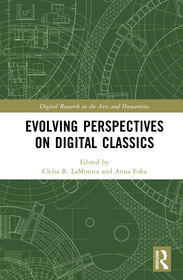
Evolving Perspectives on Digital Classics
Series: Digital Research in the Arts and Humanities;
- Publisher's listprice GBP 145.00
-
69 273 Ft (65 975 Ft + 5% VAT)
The price is estimated because at the time of ordering we do not know what conversion rates will apply to HUF / product currency when the book arrives. In case HUF is weaker, the price increases slightly, in case HUF is stronger, the price goes lower slightly.
- Discount 10% (cc. 6 927 Ft off)
- Discounted price 62 346 Ft (59 378 Ft + 5% VAT)
Subcribe now and take benefit of a favourable price.
Subscribe
69 273 Ft

Availability
Not yet published.
Why don't you give exact delivery time?
Delivery time is estimated on our previous experiences. We give estimations only, because we order from outside Hungary, and the delivery time mainly depends on how quickly the publisher supplies the book. Faster or slower deliveries both happen, but we do our best to supply as quickly as possible.
Product details:
- Edition number 1
- Publisher Routledge
- Date of Publication 6 November 2025
- ISBN 9781032899824
- Binding Hardback
- No. of pages230 pages
- Size 234x156 mm
- Weight 453 g
- Language English
- Illustrations 35 Illustrations, black & white; 35 Halftones, black & white; 6 Tables, black & white 700
Categories
Short description:
Evolving Perspectives on Digital Classics contributes to a broader understanding of how digital humanities methods enhance classical studies. It offers an overview of current approaches and considers how new techniques can address diverse research questions.
More
Long description:
Evolving Perspectives on Digital Classics contributes to a broader understanding of how digital humanities methods enhance classical studies. It offers an overview of current approaches and considers how new techniques can address diverse research questions.
The volume includes contributions from Sweden, Norway, Greece, Italy, the US, the UK, and Australia and primarily examines ancient textual and material data that connect multiple disciplines, focusing on what researchers can do beyond rigid boundaries. Part I discusses annotating and describing ancient narratives and entities. Part II explores the digital representation and modelling of ancient spaces. Part III highlights computational and AI-driven literary analysis. Part IV focuses on philological methods in digital text analysis. Part V considers innovative applications in cultural and educational contexts.
Evolving Perspectives on Digital Classics demonstrates how digital methodologies can deepen understanding of the ancient world. The book encourages readers to adopt sound practices in data curation and analysis. It will appeal to scholars and students from a wide range of disciplines, including digital humanities, classics, philology, archaeology, and ancient history.
MoreTable of Contents:
Introduction to Evolving Perspectives on Digital Classics: Innovation, Methodology, and the Ancient World; Part I Annotating and Describing Ancient Narratives and Entities; 1. Structuring the Sights and Stories of Pausanias with Wikidata; 2. SLaVEgents: Digital Prosopography of Enslaved Persons in Western Eurasia and North Africa (1000 BCE-300 CE); Part II Ancient Spaces; 3. The Data of Mythic Spaces; 4. From the Pillars of Heracles to Ecbatana: Digital Representation of Ancient Travel Narratives; Part III Computational and AI-Driven Literary Analysis; 5. Artificial Intelligence for Classical Literary Texts; 6. Stylometry for Latin Literary Criticism; Part IV Philological Methods in Digital Text Analysis; 7. Pretrained Word Vectors for Latin Philology; 8. Deciphering Ancient Scripts: Integrated, State-of-the-Art Approaches; Part V Innovative Applications in Culture and Education; 9. New Technologies for Learning and Teaching Ancient Greek and Latin; 10. Digital Art History, Digital Humanities, and Digital Classics: Finding the Missing Link
More



